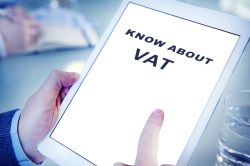 Register for VAT by December 4, 2017
Register for VAT by December 4, 2017 VAT implementation is all set to create over 5000 jobs in GCC
VAT implementation is all set to create over 5000 jobs in GCC The Federal Tax Authority (FTA) to Join e-Dirham System
The Federal Tax Authority (FTA) to Join e-Dirham System  Saudi, UAE to Enhance Collaboration for Boosting Their Economies
Saudi, UAE to Enhance Collaboration for Boosting Their Economies VAT Rules not yet finalized: UAE Ministry of Finance
VAT Rules not yet finalized: UAE Ministry of Finance No VAT on Sale and Purchase of Shares in UAE
No VAT on Sale and Purchase of Shares in UAE VAT Implementation may Bring Some Changes in Tourism and Hospitality Sector
VAT Implementation may Bring Some Changes in Tourism and Hospitality Sector 15th, November Last Date to File Excise Returns and Pay Dues in UAE
15th, November Last Date to File Excise Returns and Pay Dues in UAE  Fuel Prices to Rise Due to VAT Implementation in UAE
Fuel Prices to Rise Due to VAT Implementation in UAE Senior banker urged to postponed the implementation of VAT in UAE
Senior banker urged to postponed the implementation of VAT in UAE VAT Regulations in UAE Receives a Green Signal from Sheikh Mohammed
VAT Regulations in UAE Receives a Green Signal from Sheikh Mohammed VAT launch on 1st January 2018 asserted by Tax chief
VAT launch on 1st January 2018 asserted by Tax chief  No VAT will be levied on amount withdrawn from other bank’s ATM
No VAT will be levied on amount withdrawn from other bank’s ATM
The GCC states have announced VAT and also concluded a broad framework for the introduction of VAT where they have set out the underlying principles of VAT laws for the six GCC countries who are VAT ready, some member states will have some flexibility on how VAT will be applied to some key sectors in their jurisdiction.

Ever since the Ministry of Finance has announced the introduction of new consumption tax called Value Added Tax in UAE, the whole nation is trying its best to get in terms with the new tax rule and adjusting their personal and business operations in accordance with the law

As the VAT implementation date is nearing, the businesses are immense pressure to set up the entire VAT enabled IT Platform for easy VAT management. In a recent survey by Thompson Reuters & ACCA highlighted the different scenario altogether. According to the survey majority of the businesses are still not VAT ready as their IT system is yet to be updated in accordance with the proposed tax law. This has exposed and highlighted the number of shortcomings and challenges faced by businesses currently, ahead of the VAT implementation.

UAE is about to implement a new taxation law in the form of Value Added Tax or VAT but many nations of the west including the UK has successfully implemented and executed the law. At times reforms do not achieve their objectives successfully and sometimes even have to be reversed.

Majority of the UAE residents are acutely aware of VAT and they have been closely following every new update relating to the new tax regime as its implications are far more down rooted in their day to day lives. With the announcement of VAT to be implemented in the UAE from 1 January 2018, many small businesses would be worried about the impact this has on their customers.

The members of the GCC council are in the midst of approving the highly anticipated common framework for the introduction of a Value Added Tax (VAT) system in the GCC. The common VAT framework will form the basis for the introduction of a national VAT system by each Member State.

The long wait for anticipated common framework may soon come to an end as The GCC Member States are in the process of approving the framework for the introduction of a Value Added Tax (VAT) system in the Gulf region. It will act as a blueprint for the other member states to apply the law in their respective nations. VAT is expected to be introduced at a standard rate of 5 percent with certain exceptions including healthcare, basic food items, education and charitable activities. VAT in UAE would be implemented from 1st January 2018 while other GCC countries may do so at the same time or by the beginning of 2019 at the latest. So we have compiled basic questionnaires to give you overview about the low and its implication on you in a brief way.

The Federal Tax Authority (FTA) of UAE has announced that it has opened its online portal to allow for taxpayers to register for VAT purposes. The FTA has also determined the deadlines for the application for VAT registration based on business turnover


